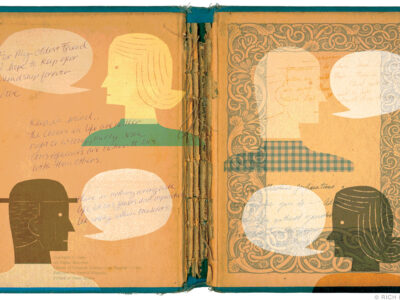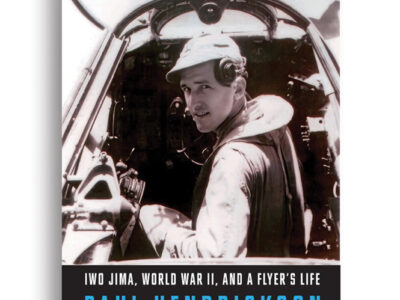
Over the past half-dozen years or so, it’s probably safe to say that Larry Dark C’81 has read more short stories than anyone else on the planet. Until recently, Dark was series editor for the annual O’Henry Prize Stories anthology, each year culling 20 stories from roughly 3,000 published in magazines from The New Yorker to obscure literary journals.
The high-water mark for inclusion of Penn alumni writers was the 2000 volume, which featured stories by first-prize-winner John Edgar Wideman C’63 Hon’86, J. Robert Lennon C’92, and Alice Elliott Dark C’76 (who is also his wife) [“Off the Shelf,” November/December 2000].
Earlier, Dark had edited several theme anthologies, including Literary Outtakes, The Literary Ghost, The Literary Lover, and The Literary Traveler. After producing the 1997 through 2002 O’Henry volumes, he was ousted as editor in one of the shakeups common in today’s publishing world. The Gazette caught up with him as, with mixed feelings, he was experiencing his first short-story-free spring since the mid-1990s.
Gazette: When you came in as editor, what was the state of the series? I know you made some changes. What was the motivation for that?
Larry Dark: One of the first things I wanted to do was bring back having a jury of writers select the top stories. When I found out there was an opening for the job [of series editor], I went to the local library and found these volumes from the 1940s, and they had juries. In that day, they gave a lot of credence to academics and critics, which today’s reader I don’t think would care about as much as a name writer. So that’s the major change that I brought, and the first year the jury was David Foster Wallace, Thom Jones, and Louise Erdrich.
I also pitched better magazine listings. William Abrahams [series editor for the previous 30 years] only listed about 100 magazines. My first task was to contact all these magazines and ask to have them sent to me and we got up to about 240-250 each year. A large part of the readership for short stories and for this book are people who write stories themselves or who aspire to write, and besides reading the stories they look to the volume as a resource.
Gazette: Were the introductions difficult to write?
Dark: Yes. The biggest question I wrestled with each year is, do I mention every story? And if I don’t, which ones do I mention? My wife had been in the [other major annual anthology], The Best American Short Stories, before I started doing this, and I went to the introduction to see what [the guest editor] was going to say about the story. And he didn’t say anything about it.
So the first year I said, I’m going to mention every story and say something about that story, to be generous to the writers. And, you know, to connect it for the reader. But [later] I vacillated —different years I would mention every story, and other years I just kind of ran through and then tried to find what connected the stories. So the introduction is something I always wrestle with, always do a lot of drafts on, and that’s my piece of writing in every book.
Gazette: You’d done other anthologies before, but nothing like this. Were you prepared for the volume of reading involved? And how did you physically manage it?
Dark: I wanted the job, and I figured, well, I’ll find a way. I knew there would be a lot of reading —and I knew that the way I am, I would make it as hard a job as possible! In the beginning, I really read flat-out seven-10 stories a day and really kept up. But once I had produced a book —and I not only had to choose the next volume but promote the one that was out—there were greater demands on my time. Plus, I had another fulltime job the whole time and a family and all the others things that happen. After a few years, I took on some assistants. I would ask them to tab anything that was at all interesting, and I would read them. It worked out very well.
Gazette: Based on your intense reading, can you make any comments about the state of the short story today?
Dark: What I find encouraging is that so many people are writing fiction and trying to get published. Every year there were really good stories—but if you think of great stories for all time, there may be years when there aren’t any published. That’s a whole other level.
The other thing is I think the story needs advocacy as a cultural institution the way poetry has done. There’s a national poetry month, and I think there should be a national short-story month, too. It’s a very American form. From Hawthorne and Poe to Hemingway, Fitzgerald, and Faulkner, almost every great American writer has done the short story, and there are some great writers, like Flannery O’Connor, who practically only wrote short stories. Funding for the arts has been cut, but there’s a lot of activity around the short story, and I think it could be promoted and brought to people’s attention a little better. But even without something like a story laureate, people will keep writing stories. There’s no stopping them, and I think that’s a good thing.




